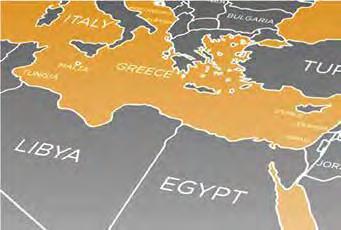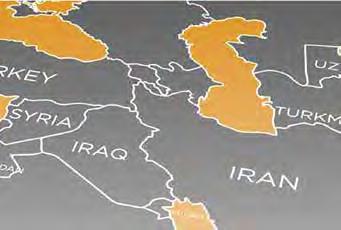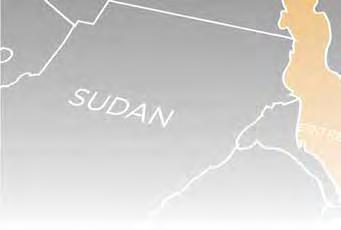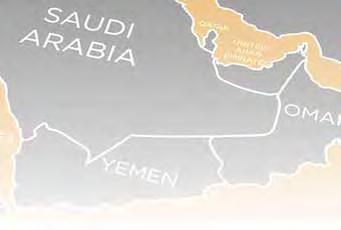
14 minute read
Shammai Siskind ISRAEL106





Biden’s Middle East Strategy

BY SHAMMAI SISKIND
In early January, workers at the port of Ashdod carefully loaded a container of green trucks and radar systems to be delivered to their overseas destination.
The buyer of this advanced military hardware was none other than the U.S. Army, which had purchased several batteries of Israel’s Iron Dome system back in the summer of 2019. The January shipment was, in fact, the second such delivery after the Americans received their first full battery set from Israel back in September.
Between the first and second delivery of these systems, drastic changes took place in the United States. A new president was elected, political violence and polarization escalated to dizzying heights, and a very different foreign policy agenda was set in motion.
By all accounts, in Washington today, there is a very strong sense of “in with the new, out with the old,” as the fresh administration sets about overturning much of what the previous one put into place. But in some very important ways, the Iron Domes that sailed into American military ports embody the bits that have stayed the same – despite expectations to the contrary.
As a candidate, Joe Biden made some very substantial commitments with regards to America’s activities abroad. His first few weeks as president were spent putting many of these commitments into action. Many – but not all.
On the campaign trail, Biden spoke about the havoc that Trump had inflicted or enabled in the Middle East over the past four years. Particular focus was placed on Trump’s policies toward Iran, the Gulf states, and surrounding conflicts. Biden criticized Trump’s so-called maximum pressure strategy on the Islamic Republic and questioned seriously the open support he offered Iran’s foes in the region.
The concerns raised by teamBiden were not empty. Many of them were shared by policymakers in Trump’s own party and even members of his administration. Should the United States be supporting Saudi-led coalitions in Yemen just because they are up against Iranian proxies? Should Washington be supplying weapons for these conflicts to be waged? If, after two years, Iran has not capitulated, is the maximum pressure strategy really the best idea?
The Great Undoing
From the moment Biden took office, the region was waiting with baited breath for the proverbial hammers to drop. And drop they did.
On February 4, President Biden announced that the U.S. will no longer support Saudi Arabia’s offensive military operations in Yemen. This effectively ended a five-year-long policy that began under Biden’s former boss Barack Obama and continued through the Trump Administration.
“This war has to end,” Biden said during his first address to the State Department. “And to underscore our commitment, we’re ending all American support for offensive operations in the war in Yemen, including relevant arm sales.”
The incursion into Yemen by Saudi Arabia and the United Arab Emirates began in 2015, ostensibly to combat the Iran-backed Shia Houthi rebel movement. From the outset, the war has been the personal initiative of Saudi Crown Prince Mohammed bin Salman and received substantial U.S. backing in the form of intelligence, military advice, and, most importantly, logistical support that allowed many large-scale military operations to take place.
The war began to draw negative press as reports emerged of coalition strikes hitting schools, hospitals, and wedding convoys. Civilian casualty numbers began to explode. Today, the Yemen conflict has become the single largest humanitarian crisis in the world, with some 12,000 civilians killed in military operations and another 85,000 dying from the resulting famine that has swept across the country.
As opposition to the war mounted in Congress, Trump was forced to veto measures by the Senate aimed at cur-
tailing arms sales and other support to the Gulf coalition. Rocket attacks by the rebels on Saudi civilian targets and ocean assaults on shipments in the Gulf (not to mention the atrocities being committed by the faction in Yemen itself) demonstrated that the Houthis needed to be defeated at all costs. If not, an Ayatollah-backed militant group would be left to wreak havoc in Yemen.
If left unchecked, the Houthis, it was feared, would conquer all of Yemen along with its vital maritime trade routes linking the Red Sea with the Gulf of Aden. At the same time the Houthis were gaining ground, the unstable Yemen became a hotbed for jihadist groups including al-Qaeda and ISIS. All of these factors pushed Trump to maintain his support for the coalition. On January 20, 2021, however, the lynchpin holding that support in place was removed.
In addition to pulling active aid for the collation’s efforts, Biden also put an indefinite halt on arms sales to the United Arab Emirates and the Saudis and even blocked several deals already slated to be approved. The administration said these sales would be blocked until undergoing “review.” Among the deals held back by Biden was the much-publicized sale of the F-35 combat plane, the most advanced stealth fighter system in the world.

Burning Western fl ags in Iran
The next act in upending the Trump-era policy with regards to Yemen came just a few days later when the State Department announced that the Houthis rebels would no longer be designated a terror organization. In doing so, the U.S. State Department reversed one of the most controversial acts of Trump’s Secretary of State Mike Pompeo, which critics warned could block aid from being delivered to areas under Houthi control. In a statement, a spokesperson for Biden’s brand-new head of the Department Antony Blinken told reporters that the decision was due to “the humanitarian consequences of this last-minute designation from the prior administration, which the United Nations and humanitarian organizations have since made clear would accelerate the world’s worst humanitarian crisis.”
The last and perhaps most significant in these series of reversals was Biden’s decision to re-engage the Iranians on the Joint Comprehensive Plan of Action (JCPOA), the so-called Iran nuclear deal in which Tehran agreed to curtail its nuclear activities in return for easing US sanctions. Trump unilaterally removed the United States from the deal in 2018.
The man tapped to head the Biden administration’s negotiations was one Robert Malley, head of the non-profit International Crisis Group based in Washington, D.C. Malley and Biden go way back, as it was Malley whom Barack Obama chose to formulate much of JCPOA’s terms back in 2015. This very choice of chief negotiator is seen as a strong sign of the administration’s plans to go soft on Iran.
To give an idea of Malley’s leanings, in 2008, Obama was forced to sever ties with Malley during his first presidential bid after having taken him on as an informal consultant. Obama dumped Malley after British media reported on the diplomat’s close ties with Hamas, a designated terror group. Malley claimed that his contact with Hamas was only for the purposes of furthering his peace-promoting work. Seven years later, Malley was back with Obama’s team, this time as the lead negotiator for the president’s deal with the ayatollahs. Now, Malley is in the White House once again, tasked with reconstructing the deal that he helped build nearly six years ago.
Not What Meets the Eye
The trend of the past two weeks has been hailed by Biden’s supporters both at home and internationally as the long-awaited reversal of the last administration’s stance on the Gulf. According to this view, Trump’s strategy in the region was excessive – even erratic. Biden’s swift actions since late January have all been important steps in reverting back to “normal” foreign policy. Furthermore, the pattern heralds Iran’s salvation. After four years of dealing with an openly hostile administration, weapons have been denied to their enemies, their proxies are no longer designated as
terrorists, and the man who delivered their golden Obama-era deal six years ago is back in charge.
But while many of these developments are certainly conditions the Iranians desired, they are far from fulfilling all the ayatollahs’ every wish. Indeed, many observers who had hoped Biden would revert back to the Obama status quo have been baffled by some of the current president’s actions.
On February 7, U.S. media reported that the Biden administration will not lift sanctions to get Iran back to the negotiating table. The same report suggested the measure would only happen if Tehran proved that it had put a halt to all uranium enrichment. “No,” Biden said when asked by an interviewer if he would make the move to start negotiations. The president nodded when the reporter asked in a newly released interview clip if Tehran must stop enriching fissile material first.
The declaration by Biden was a surprise to many, but it was not the first sign the administration was taking a more hardline stance than expected. Days earlier, Biden rejected an Iranian offer to coordinate both countries’ return to their nuclear deal commitments. The U.S. State Department argued that the Islamic Republic must first reinstate restrictions the regime suspended in response to the U.S. abandoning the agreement entirely nearly three years ago.
“If Iran comes back into full compliance with its obligations under the JCPOA, the United States would do the same,” State Department spokesperson Ned Price told reporters at his first press conference, “[but] we are a long way from that,” he concluded.
Price’s comments were in response to a proposal by the Iranian Foreign Minister Mohammad Javad Zarif, in which Washington and Tehran would synchronize their JCPOA-related moves under the supervision of the European Union. The State Department is adamant, however, that Iran first independently prove compliance.
As many – including ardent Biden supporters – have pointed out, this move has predefined reconciliation with Iran from the outset as a perpetual game of chicken. From Iran’s perspective, it was the U.S. that abandoned its commitments, and thus Washington must make the first move. As far as the U.S. administration is concerned, no talks are possible before Iran shows it is serious.
This stipulation was taken as a huge disappointment by all who see Biden as the ultimate repudiation of Trump and, in essence, an abandoning of Biden’s campaign commitment to heal ties with Iran.
The narrative that the administration is now “pro-Iran” is further undermined when examining the details of Biden’s actions vis-à-vis Yemen.
True, Biden did put an end to some of America’s more substantial support for the coalition, but this does not mean Biden is now pushing for an outcome favorable to Tehran. After stating his decision to pull support for offensive operations in Yemen, Biden announced the appointment of Timothy A. Lenderking, a Foreign Service veteran, as U.S. special envoy for Yemen. His appointment was, in fact, welcomed by Saudi Arabia, with its foreign ministry issuing a statement of support. Ahmed Awa Bin Mubarak, the foreign minister of Yemen’s internationally recognized government, also applauded Lenderking’s appointment.
The reason Yemen and the Saudi’s both approved of the appointment is due to a simple fact. The appointment of the special envoy was not to undermine the coalition’s stance but simply to advance it by other means. Lenderking, who has reportedly already been in contact with Yemeni officials, is not interested in granting the Houthis a free pass and certainly will not offer them any more control in the country. And while the Emiratis will not be receiving their promised F-35s any time soon, they will
continue to receive U.S. assistance to some degree or another in combating common militant foes. In the same speech pulling U.S. support in Yemen, Biden praised the UAE as important partners in the region’s “counterterrorism offensive,” which Washington will continue supporting.
In short, what Biden is trying to achieve in Yemen is to quell the humanitarian disaster that has unfolded there, a goal which is, objectively speaking, completely reasonable. This means the quelling all-out war and an end to civilian casualties. But Biden is not oblivious to the militant actors that still reside in Yemen or the dangers posed to the region at-large.

Supporters of the Houthi militia in the streets of Sanaa, Yemen
A New Game with New Rules
Biden’s re-engagement with Iran. The move to re-ignite talks is not a foolhardy pacifist gesture, rather a pragmatic attempt to address the Iran problem in a different way. But even Biden likely knows the old Obama way is no longer an option.
While Biden may want to publicly portray the conversation on Iran as one on nuclear capabilities and uranium enrichment, the reality is, and has always been, far different. The real threat of Iran for decades has been its unbridled support of militancy and an increasingly expansionist agenda throughout the Middle East. Iran’s nuclear program, whether it desired to obtain atomic weapons or not, simply provided a distraction to this reality. Blinded by the fear of a nuclear-armed Iran, much of the free world was prepared to forgo all other concerns and thus made a trade with the ayatollahs: guarantees of curtailing nuclear activities in exchange for leaving them alone. The drawbacks of this decision began to manifest immediately. Once sanctions were initially lifted in 2015, Iran’s support of its proxy Hezbollah increased by as much as four-fold. Iran was able to advance its missile technologies, some of which was likely used in Houthi attacks against the Saudis. Iran was able to field militias in Iraq and Syria, increasing the violence that engulfed both of those nations. Iran was able to run both militant and illicit financial schemes around the world, from Germany to Trinidad. This was ultimately the rationale for the Trump administration leaving the deal three years ago and reimposing sanctions on Tehran. It was not the nuclear program per-se but the long list of Iran’s aggressive activities that were devastating the region.
Biden, for either political or practical considerations, is taking a different approach to Iran. But the administration cannot deny that the threat Iran poses must be taken seriously and contained. This sentiment was clearly recognized by Biden’s own National Security Advisor Jake Sullivan when, in a late January press conference, he slammed Iran’s “malign behavior,” including the country’s advancing ballistic missile program.
Biden’s pick to head the Defense Department, former general Lloyd Austin, has called Iran a “destabilizing element” in the region and a country that posed a direct threat to U.S. interests. When asked about re-entering the nuclear deal about a month ago, Austin stated, “The pre-conditions for us considering to reenter into that agreement would be that Iran meet the conditions outlined in the agreement. I would hope that, as we enter into that agreement, we could look at some broader things that may or may not be a part of this treaty, but certainly things that I think need to be addressed. One of those things is ballistic missiles.”
Far from pandering to Iran, Biden’s policy is, in fact, taking into consideration the very real dangers of the regime. While the president is clearly trying to advance stability in the Gulf, he is not granting Iran carte blanche. Following this vein, Biden understands that whatever moves he makes that would ease pressure on Iran must be accompanied by protections for its own allies.
Which brings us back to the United States’ recently acquired Iron Domes.
When the U.S. announced it would be purchasing the missile defense system from Israel in 2019, the stated purpose was to defend Army units from short-range projectile attacks while operating in hostile areas. Recent reports have revealed, however, that the Israeli
systems will, in fact, be deployed in unspecified “Gulf countries.” Rumors that Arab states may purchase Iron Domes from Israel have begun circulating more than two years ago. All have been fervently denied by both Israel and other states. But now it is official. The Iron Dome will be used to defend Saudi Arabia and most likely the UAE from possible attacks emanating from Yemen or even Iran itself.
The U.S. supplying these systems to its Gulf allies serves two purposes.
First is a practical one. Saudi Arabia has been coping with Houthi rocket attacks for years. Even the American Patriot missile batteries it received failed to provide ample defense. The Iron Dome is an extremely reliable system, having a total of 1,200 confirmed intercepts since the first batteries came on line in 2011.
But the second and more important purpose to the Iron Dome being deployed in the region is the signal it sends to Iran. Biden may have advertised himself as the undoing of Trump, but this does not mean he is unaware of Iran’s aggressions, for in today’s Middle East, these can no longer be ignored.
Always take them with you!
COVID-19 is still here. Keep wearing your face covering:

• Anytime you are outside your home • If you live with others and have any COVID-19 symptoms
Always make sure it fits tightly and covers your nose, mouth and chin to best protect yourself and those around you.
COVID-19 vaccines are now available to certain groups in New York City.
To learn more about COVID-19 and vaccines, visit nyc.gov/health/coronavirus.










